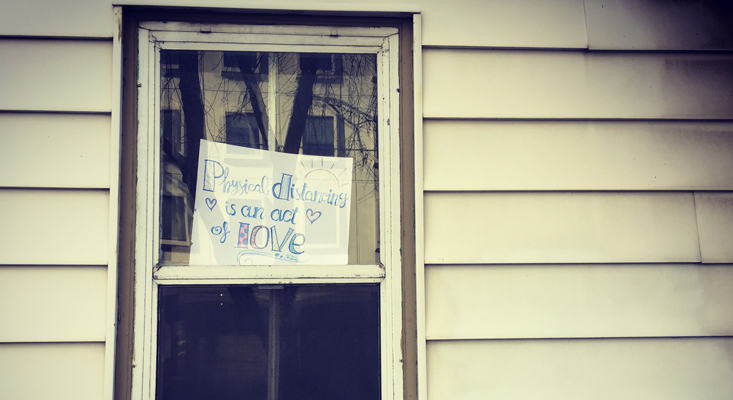What is this pandemic doing to our minds? Polls repeatedly show it’s having an adverse effect on our mental health. Physical distancing, for some, means social isolation, which has long been shown to encourage depression. Previous disasters have been followed by waves of depression, exacerbated by financial distress. The situation also puts us in a state of fear and anxiety—anxiety about financial strain, about being lonely, about the very lives of ourselves and our loved ones.
This fear can also bring out some of the everyday irrationalities we all struggle with. We have trouble thinking about numbers—magnitudes, probabilities, and the like—and when frightened we tend toward absolutes. Feeling powerless makes people more prone to conspiracy theories. We naturally believe that big effects should have big causes, and we see with the current coronavirus, as we did with AIDS and SARS, conspiracy theories claiming that the virus was engineered as a weapon.
We are seeing the theory of “collective resilience,” an informal solidarity among people, in action.
These psychological ramifications can make us fail to behave as well as we should. We have what psychologists call a “behavioral immune system” that makes us behave in ways that, in general, make us less likely to catch infectious disease. Things we perceive as being risky for disease makes us wary. An unfortunate side effect is that it increases prejudice against foreigners, people with visible sores or deformities, and people we perceive as simply being ugly. Politically, this can result in xenophobia and outgroup distrust. Coronavirus-related attacks, possibly encouraged by the misleading term “Chinese virus,” have plagued some ethnic Asian people.
And yet, in spite of all of the harm the pandemic seems to be wreaking on our minds, there are also encouraging acts of kindness and solidarity. In turbulent times, people come together and help each other.

In the days after the World Trade Center fell, it wasn’t just the police, hospitals, and firefighters who came forward to help, it was normal citizens who often put themselves at risk to help other people out. An equities trader named Sandler O’Neill helped rescue a dozen people and then went back to save more. A tour guide at the Pentagon helped victims outside, and then went back in the burning building to help more. We find these kinds of behaviors in every disaster.
During this pandemic, we see the same thing. Some acts are small and thoughtful, such as putting encouraging signs in windows. Others have made games out of window signs, putting up rainbows for children on walks to count. Some show support for health care and other frontline workers, applauding or banging on pots on their balconies and at windows in a nightly ritual. Others are helping in more substantial ways. In the United Kingdom, over half a million people signed up to be a National Health Volunteer, supporting the most vulnerable people, who have to stay home.
John Drury, a professor of social psychology at the University of Sussex, England, who studies people’s behavior in disasters, has seen these acts of kindness in his own neighborhood over the past month. He and his neighbors set up a WhatsApp group to help one another with shopping. “I think that translates across the country and probably across the world,” Drury says. “People are seeing themselves as an us, a new kind of we, based on the situation that we all find ourselves in. You’ve got this idea of common fate, which motivates our care and concern for others.”
We have always been a social species who rely on each other for happiness and our survival.
Drury is the pioneer of a theory known as “collective resilience,” which he describes as “informal solidarity among people in the public.” Drury’s study of the 2005 London bombing disaster found that mutual helping behaviors were more common than selfish ones. This basic finding has been replicated in other disasters, including the crash of the Ghana football stadium and the 2010 earthquake and tsunami in Chile. In disasters, Drury says, people reach heights of community and cooperation they’ve never reached before.
It turns out that being in a dangerous situation with others fosters a new social identity. Boundaries between us, which seem so salient when things are normal, disappear when we perceive we’re locked in a struggle together, with a common fate, from an external threat. People go from me thinking to we thinking. Respondents in studies about disasters often spontaneously bring up this feeling of group cohesion without being asked. The greater unity they felt, the more they helped.
Popular conceptions of how people respond in a crisis involve helplessness, selfishness, and panic. In practice, though, this rarely happens. “One of the reasons people die in emergencies isn’t overreaction, it’s underreaction,” Drury says. “People die in fires mainly because they’re too slow. They underestimate risk.” The myth of panic can lead to emergency policies that do more harm than good. At one point during Hurricane Katrina, Louisiana governor at the time Kathleen Blanco warned looters that National Guard troops “know how to shoot and kill, and they are more than willing to do so if necessary, and I expect they will.” A few days later, New Orleans police officers shot six civilians, wounding four and killing two.
People revert to selfishness when group identity starts to break down. Drury describes how people acted when the cruise ship, Costa Concordia sank off the coast of Italy in 2012. “There was cooperation until one point, when people got to the lifeboats and there was pushing,” Drury says. “Selfishness isn’t a default because many times people are cooperative. It’s only in certain conditions that people might become selfish and individualistic. Perhaps there isn’t a sense of common fate, people are positioned as individuals against individuals. After a period of time, people run out of energy, run out of emotional energy, run out of resources, and that goodwill, that support, starts to decline. They just haven’t got the resources to help each other.”
Perceptions of group behavior can shape public policy. It’s important that policymakers, rather than seeing groups as problems to be overcome, which can lead to riots and mob behavior, take account of how people in groups help one another. After all, we have always been a social species who rely on each other for happiness and our survival. And groups can achieve things that individuals cannot. This understanding couldn’t be more important than now. We can build on people’s naturally arising feelings of unity by emphasizing that we are all in this together, and celebrating the everyday heroes who, sometimes at great cost, go out of their way to make the pandemic a little less awful.
Jim Davies is a professor of cognitive science at Carleton University and author of Imagination: The Science of Your Mind’s Greatest Power. He is co-host of the Minding the Brain podcast.
Lead image: Franzi / Shutterstock


























